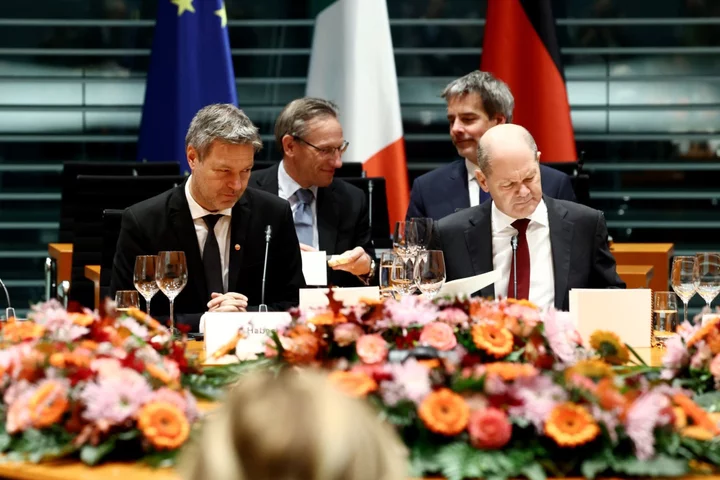Scarce charging stations and shrinking subsidies already have contributed to a slowdown in Germany’s rollout of electric vehicles. Now, the industry is bracing for another potential roadblock.
Chancellor Olaf Scholz’s government had earmarked some €212 billion ($231 billion) through 2027 for projects including charging stations, battery plants and semiconductor factories. A surprise ruling by the nation’s top court has upended fiscal planning and raised doubts as to whether all the funds still will be available.
The government may need to plug a hole in next year's budget of as much as €24 billion, a senior lawmaker from Scholz’s coalition told Bloomberg Television this week. While the chancellor has said Berlin will come up with the funding for projects essential to the transformation of Europe’s biggest economy, talk is cheap for executives who want assurances the money they were promised will land in company coffers. Observers expect the political infighting over how to resolve the crisis to drag into next year.
The delays have sowed uncertainty among companies working on EV projects, including plans by Volvo AB, Daimler Truck Holding AG and Volkswagen AG’s Traton to install 1,700 chargers for electric commercial vehicles across Europe. Their joint venture, called Milence, plans to open its first charging hub next week in the Dutch city of Venlo.
Milence declined to say when it would expand to Germany — which it’s identified as its largest potential market — or how many sites it’s eying for the country. Germany had budgeted around €1.5 billion annually from 2024 to install high-performance chargers.
“Everybody still hopes there will be a solution found and things can move on as planned,” a spokesperson for the company said. “We’re still confident that we can reach our goals — not just 1,700 all over Europe, but also the German ones.”
Germany’s EV industry already was facing plenty of issues, from internal foot-dragging over the ditching of combustion cars, to software stumbles and sub-par demand for early battery-powered models. Volkswagen signaled this week it may cut more staff at its namesake brand, after already cancelling shifts and laying off temporary workers due to waning EV orders. Suppliers including Michelin and Continental AG have announced plans to close factories in the country.
Years of flawed energy policy, sclerotic bureaucracy and a cost-of-living crisis have weighed on Germany’s appeal as an ideal destination for new investment, and the country is forecast alongside Italy to post the weakest growth among major euro-zone nations this year. US President Joe Biden’s Inflation Reduction Act, meanwhile, is luring companies eager to manufacture more batteries and EVs.
Sweden’s Northvolt AB was due to receive funding for an EV battery plant in northern Germany, and Berlin also promised some €20 billion in aid to bolster local chipmaking in a push to shore up supplies for the country’s tech sector amid escalating geopolitical tensions.
The money is earmarked for projects including a €10 billion Taiwan Semiconductor Manufacturing Co.-led factory in Dresden, and a €30 billion Intel Corp. chip plant in Magdeburg. These facilities are expected to supply automotive companies, among other clients.
“The government must present a plan as quickly as possible as to how it will shape Germany’s future,” said a spokesperson for the VDA, Germany’s main cars lobby. “Companies in the German automotive industry as well as consumers urgently need clarity, planning security and reliable framework conditions.”
--With assistance from Kamil Kowalcze and Iain Rogers.

